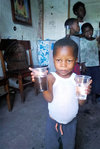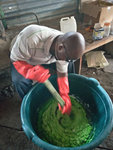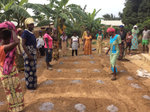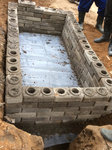





For seven years, Wayne Medrud, of Yelm, volunteered for Friendly Water for the World and did amazing things helping people as a volunteer.
Now he’s working for the company as a project manager, and because of that he will be helping many more people in the years ahead.
Friendly Water is a nonprofit organization based in Olympia. It was founded in 2010.
“Our core project right now is working with the Maasi of Tanzania,” said Will Forester, director of marketing and development. “Two years ago, we trained six groups to build biosand water filters that they could take back to their communities. Now we have returned to install water catchments and micro-flush toilets. This will dramatically improve water security and community health in the Simanjiro District not far from Mt. Kilimanjaro.”
The shining tech jewel is the biosand water filter.
“Dr. David Manz invented the biosand water filter in the ‘90s to help stop people from dying because they didn’t have clean water,” said Medrud. “He made it patent-free so anyone can use it.”
Manz, a retired University of Calgary professor, has been inducted into the Alberta Order of Excellence for not only inventing biosand but for offering it free.
“I had never gone outside the United States until 2014 when I went with my then 12-year-old son, Noah, to India,” Medrud said. “We went to learn and help with the training.”
Since that trip, Medrud has been to India six more times.
He has also traveled to Uganda, Rwanda, Tanzania, Mexico, Bolivia and the Democratic Republic of the Congo. With each visit, more people are trained in using the biosand water filter and other low tech items to keep them alive and well.
“The biosand is built with simple things that any country has: Sand, gravel and cement,” Medrud said.
An estimated 1.5 million children die every year from diseases caused by drinking polluted water.
“We train the people in their own country and in turn they train others,” Medrud said. “When I arrive to help train, I didn’t have a translator come with me, I never do, but I am always able to find someone there who speaks English and is willing to translate.”
Friendly Water helps with other simple technology as well.
“We have other ways to improve people,” Medrud said. “Rain harvesting that uses ferrocement tanks is one.”
Everything needed to build these tools are locally available. Not only does this give people ways to stay healthy, it gives local people employment as well. They teach people how to permagarden, which is a way to create year-round, nutritious food.
“For building we teach ISSB, Interlocking Stabilized Soil Blocks, which fit together kind of like Legos. The blocks are tightly compressed soil with cement. They don’t need mortar since they lock together,” Medrud said.
Another help is liquid and bar soap that doesn’t use palm oil.
“Rainforests are burned down so farmers can plant palm groves for oil, which is bad for the environment,” Medrud said.
Recently during an Ebola outbreak in the Democratic Republic of Congo (DRC), a Catholic priest in Goma was handing out bars of soap made without palm oil after training with Friendly Water.
“We’re envisioning next hand washing stations,” said Medrud.
Living Water also trains people to make rocket stoves that are efficient, with little smoke produced from cooking, which prevents respiratory problems. The stoves are hot burning, which uses less fuel.
“And food is cooked faster,” Medrud said.
The newer technology is a micro-flush, worm-composting toilet.
“All the technology Friendly Water uses is simple enough that a 10-year-old can understand and build them,” Medrud said.
This July, Wayne and other Friendly Water trainers were in Western Rwanda.
“The village was so remote,” he said. “We traveled by 4-wheel-drive for several hours. Then we walked three-quarters of a mile through a potato field. We came up to a brick and stone wall. A building that was missing its roof. Inside was a green lawn.”
That building had been a church that was burned in 1994 during the Rwanda genocide against the Tutsi people.
“We realized that we were here at that very place on the 25th anniversary of the genocide,” said Wayne. “It gave me chills.”
For more information, visit https://friendlywater.net.